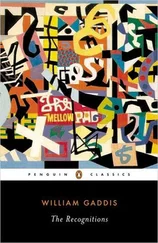Yours,
W. Gaddis

To Michael Silverblatt
[ Creator and host of Bookworm , a literary radio program broadcast since 1989 by KCRW in Los Angeles, and underwritten by the Lannan Foundation. On 18 January 1994 Silverblatt hosted an event at which William H. Gass spoke on WG, who then spoke briefly. At this time, Lannan’s Jeannie Kim expressed concerns about the program’s direction; the Kurt mentioned below was her assistant. ]
Wainscott NY 11975
13 April 1994
Dear Michael,
word has reached me of some of the pressures you are under involving Lannan’s literary program & I hope they will dissipate before things come to some sort of bureaucratic grief.
I thought (& was later told) that our presentation in January came off quite successfully, & I certainly felt I had you & Bill Gass to thank for making it more than just another of these ubiquitous ‘readings’. Gass is for me our foremost writer, a magician with the language, & it was he who’d told me before I came out there of your deep commitment to literature as your thoughtful probing confirmed, opposed to the interviewer asking whether one uses a word processor & on which side of the paper do you write?
What it all finally comes down to I suppose is what sort of writer & what sort of audience such a program wishes to attract, the difference between entertainment & exploration of ideas, of what writing & the serious writer are all about or an audience that can say I saw Irving Wallace in person on television last night, all adding up to how seriously such a literary program’s sponsor’s name is taken by its peers & any serious writer quickly spots the difference. We’re not up there reciting recipes for tapioca pudding to make some insecure bureaucrat look good after all.
A propos, when you see Kurt will you thank him for sending me the Heaney version of Philoctetes we’d discussed out there, now here again is a really good man with real ties to literature who is far too valuable to be relegated as someone’s nameless bureaucratic ‘assistant’ in what armed service slang appropriately refers to as Mickey Mouse. In situations like this one I think there’s a lot to be said for running a loose ship.
Good luck and best regards,
W. Gaddis

Irving Wallace: best-selling American novelist (1916–90).
Heaney version of Philoctetes: The Cure at Troy (1990) is the Irish poet and translator Seamus Heaney’s adaptation of Sophocles’ Philoctetes .

To Isabel and John Butterfield
[ Old British friends whom WG saw while in England for the publication there of FHO.]
Wainscott, New York 11975
30 June 1994
dear Isabel & John,
how can civility — the mere civility of a note of gratitude to old & dear friends — have fallen to such low estate as it nears a month since I have left you? In some part it may be explained (if not excused) in the enclosed FAX I just faxed to my publishers, having flown (literally) from that week of order & indulgence, of correct & thoughtful & generous behaviour on all sides, to be plunged immediately back into the Psychopathology of Everyday Life maintained all too familiarly here, leaving the accourtrements of civilised life where we left them behind 200+ years ago. Dinner in the House of Lords! I mutter to gaping friends over undergrilled fish & marble-hard potato salad; addressing a select (albeit rather small) audience in London University’s Senate Room; devouring a haunch of beef in the shade of Evelyn Waugh at the Hyde Park Motel, recounted over hash at a kitchen table; a Publication Dinner (roast wood pigeon) at Lauceston Place, retailed to my publisher here who has never come up with so much as a burger at Burger King. . All of it crowned by your warm embrace, it was a stunning time.
And I have got to say (in an immediate & similarly inexcusably delayed note to her) how deeply struck & touched I was by Mathilde’s warmth & care & sheer courage had never reached me so strongly, what we call ‘character’ I suppose in its lonely strength, ‘blood will tell’ as archie told mehitabel, breaks your heart.
The road ahead (ahead?) here is off like the course of, who was it? mounting his horse & ‘riding off in all directions’, tempting the novelist to descend to yet untold depths (‘The writer will always sell you out’ says Joan Didion) though I hasten to add you both must come off quite unscathed in the event, if event there is to be frankly at the moment I’ve scarcely the appetite for it though the possibility nay perhaps the necessity of grovelling for another advance suggests itself so me & mine are not to be seen in the Edgeware Road singing ‘Back and side go bare, go bare, but belly God give thee good ale. .’
with love and thanks again
as these things become more precious,
Willie

Psychopathology of Everyday Life: title of one of Freud’s best-known books (1901). as archie told mehitabel: “archy” the free-verse-typing cockroach and his alley-cat friend from Don Marquis’s popular newspaper columns of the 1910s and 1920s.
‘riding off in all directions’: a famous line from one of Canadian author Stephen Leacock’s Nonsense Novels (1911): “Lord Ronald […] flung himself upon his horse and road madly off in all directions” ( ODQ ). ‘The writer […] says Joan Didion: correctly, “ writers are always selling somebody out ,” the concluding sentence of her preface to Slouching Towards Bethlehem (Farrar, Strauss & Giroux, 1968).
‘Back and side […] good ale’: from a song in William Stevenson’s Elizabethan comedy Gammer Gurton’s Needle : “Back and side go bare, go bare / […] / But belly God send thee good ale enough” ( ODQ ).

To Stanley Elkin
[ Elkin’s 1985 novel The Magic Kingdom features a character named Charles Mudd-Gaddis, an eight-year-old geriatric who “dreams of his first birthday. He dreams the cake and dreams the candles, dreams the balloons and dreams the streamers; he dreams the toys, he dreams the clapping. And dreams he’s three, the little boy, who would have been a man by now — twenty, twenty-one. Then dreams the girl, six, to him a woman. And now he’s five and pushing forty. Ah, to be thirty-four again! he dreams. And dreams he’s seven and confusion comes, that white aphasia of the heart and head. And dreams in awful clarity it’s now, and can’t recall how old he really is” (Dutton, 1985, 80). ]
9 November ’94
dear Stanley,
I had been vaguely troubled by Mudd-Gaddis since first stumbling upon him & seeing you again in such fine fettle thought to get back & give him a closer look. And was stunned. How do you do it? How (p. 80) did you know ! Staggers. Though perhaps 10 years ago it mightn’t have fit so well, but prescient my God it’s I, it’s me today that brief touching elegant agonizing profile believe me real age 72 is daily more infringed by that blond pageboy off to boarding school age 5 & the confusion does come, “that white aphasia of the heart and head” sheer poetry, break those 10 lines up into 20 & what a poem it is (looking about today at what passes for ‘poetry’) in its ‘awful clarity’ for a stupefying epitaph however you may have meant it (in deconstruction’s disavowing the author’s intent) I have taken it to heart.
Читать дальше














